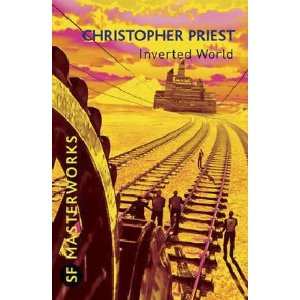I took part in a panel discussion on this recently at the British Science Festival at Bradford (along with Steven French, Una McCormack, Shana Worthen and Katy Price). Coincidentally (and very usefully), my friend Prof Rowlie Wymer had delivered an inaugural lecture on this very same theme the previous day at Anglia Ruskin University in Cambridge. He plans to write a book on the subject.
On the face of it, it’s odd how often science fiction (which after all has ‘science’ rather than religion in its title) deals with religion. But it’s a perennial theme (my own The Holy Machine being one example). Rowlie Wymer pointed out that even avowedly atheistic writers such as Stanislaw Lem or Arthur C. Clark can’t leave religious themes alone.
There are several connections. Firstly, SF is a form of fiction that is interested in Big Questions. It deals with people’s relationship with the universe, and not just people’s relationship with other people. This is something it has in common with religion. Secondly, SF is interested in how people and societies cope with new and unfamiliar environments. It would be impossible to seriously deal with this question without considering religion, which up to and including this point in history, has provided one of the means by which people explain to themselves how they fit in. (In Dark Eden, I show a society that is beginning to evolve its own religion). Thirdly, SF traditionally deals in ‘sense of wonder’ which (as Rowlie Wymer pointed out) is not unlike some forms of religious experience.
We live in a world in which religious fundementalism frequently makes itself the enemy of science. In that battle I’m definitely on the side of science. A set of beliefs about the world that are based on accepting as literally true an old book written one or two millenia ago versus a set of beliefs based on systematically examining the evidence. There’s no contest. To dismiss the latter in favour of the former is just infantile intellectual vandalism.
But I don’t align myself with atheistic fundementalism either. To reject religion in all its forms as worst than useless is, in its way, also intellectual vandalism. It is to ignore the fact that science looks at the world from a particular perspective which is not the perspective from which we actually live our lives, and is least good at answering the messy complicated questions which most concern us as human beings (for most of us are not going around worrying about what happened in the Big Bang or the precise nature of the fundemental building blocks of matter). There are a whole set of questions about life which cannot be answered in terms of cause and effect, cannot be answered at all, in fact, in the way that science answers questions, but which can be assuaged by stories.
Stories are pretty basic. Every night in our sleep, our brains weave our experience into stories. Stories are what we naturally do, not causal explanations, and religions have provided or inspired a pretty good batch of stories.
I am not defending literal-minded religion, or even religion at all, but I am saying that ultimately facts are not what our lives are about. In order to engage with the world, and other people, we need imagination.
